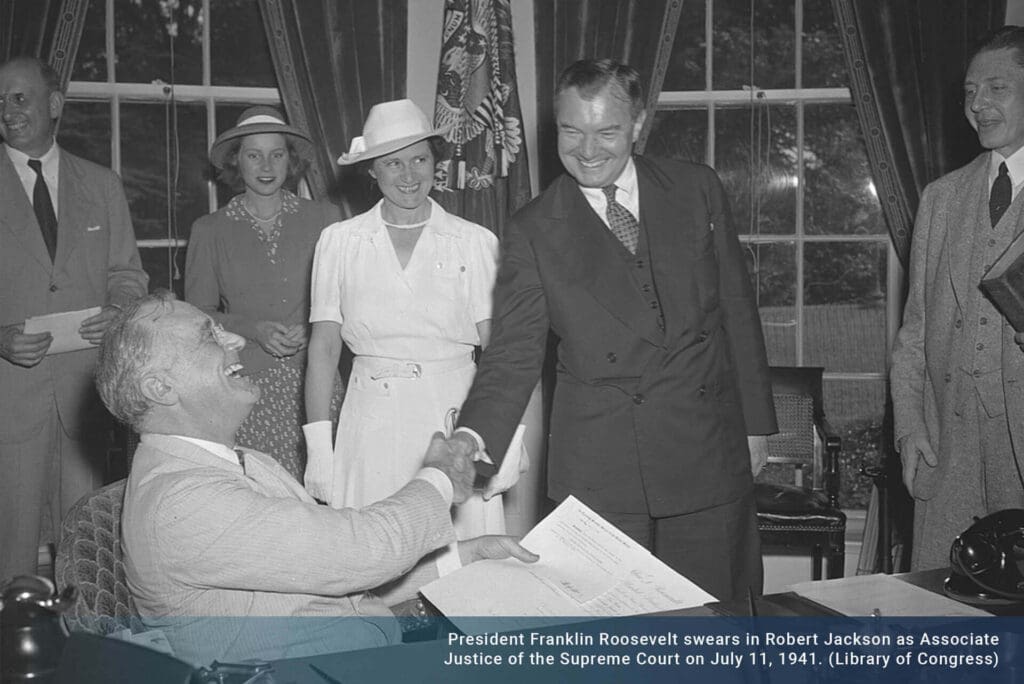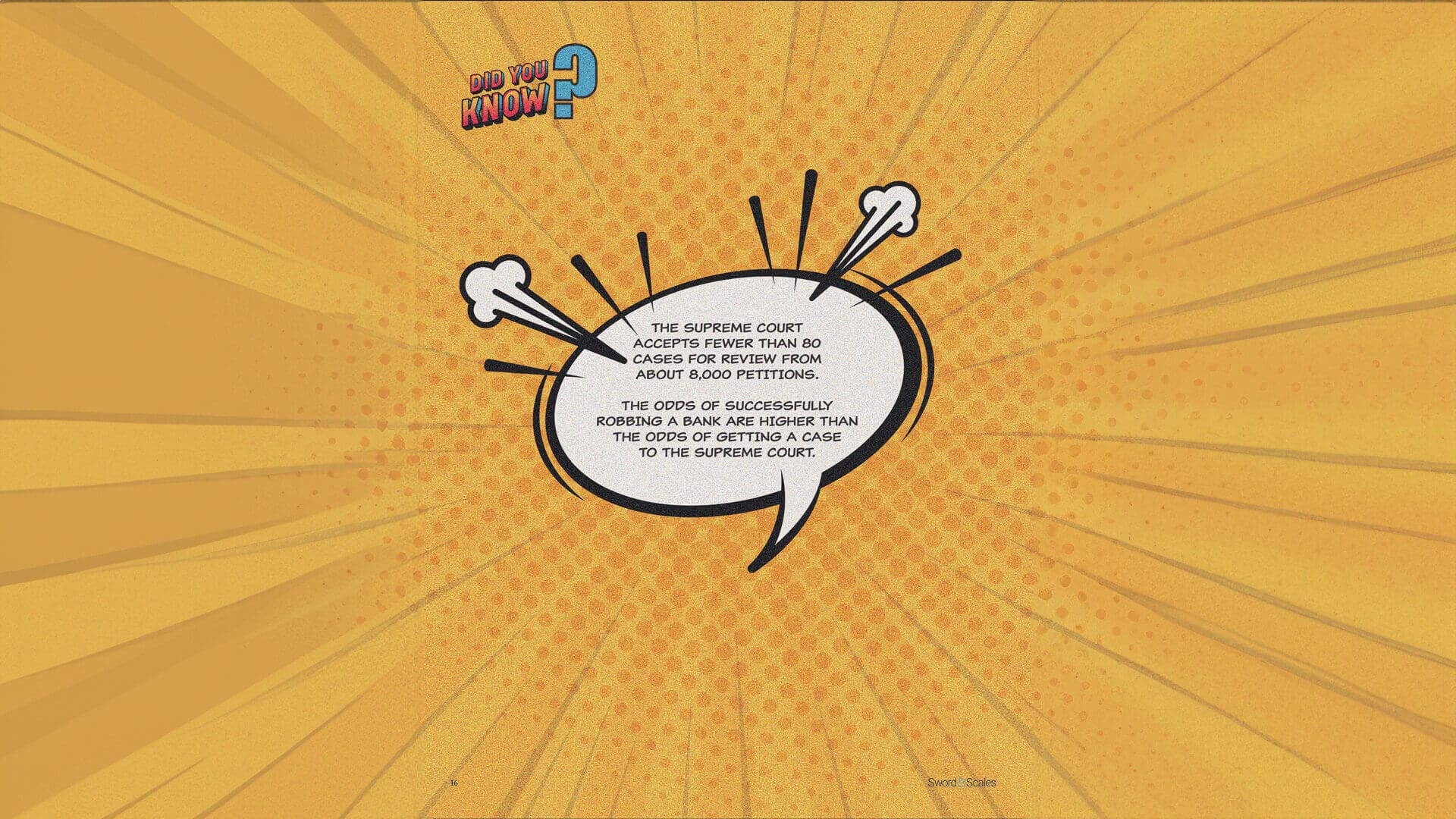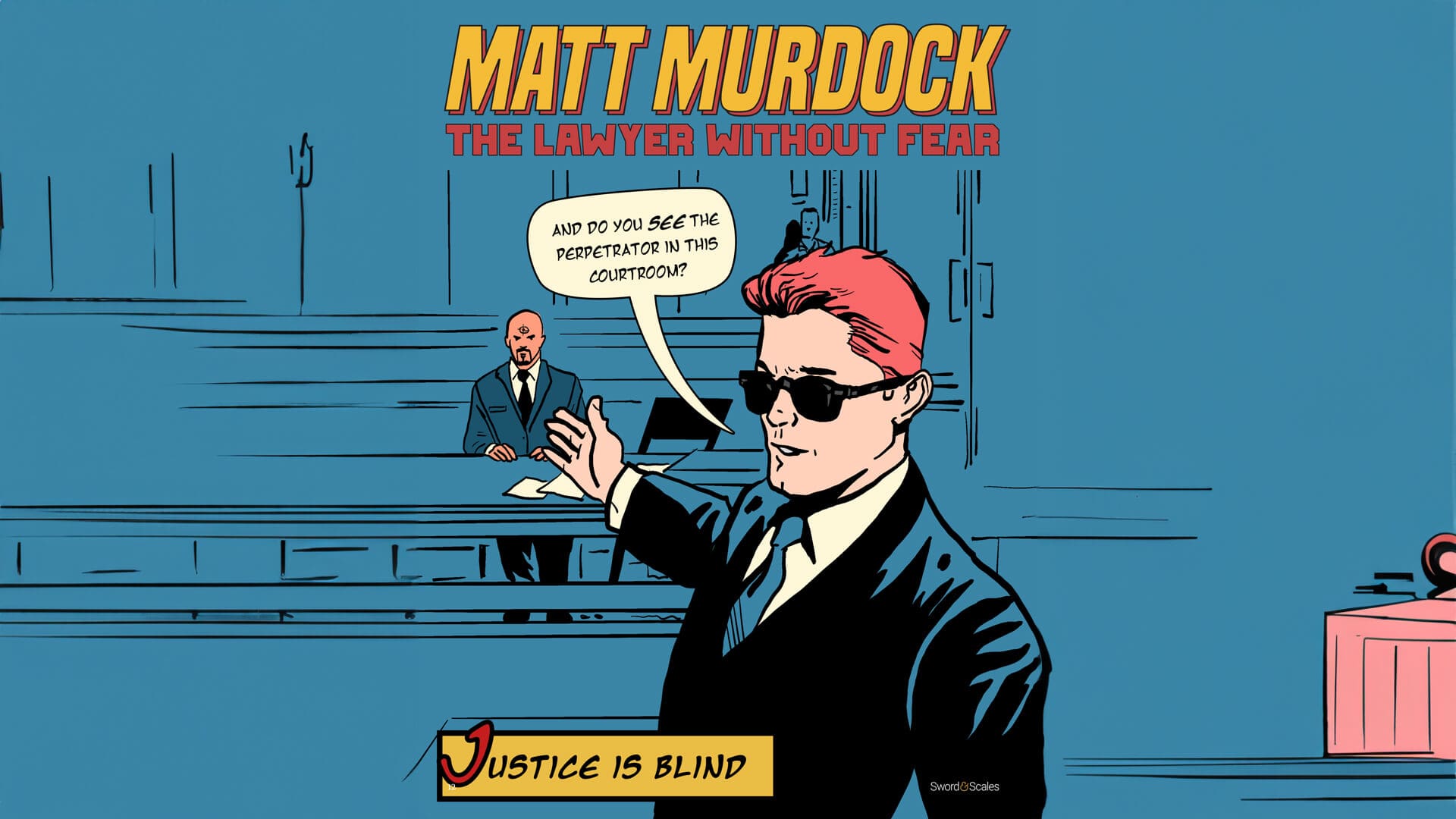ON NOVEMBER 21, 1945, Robert H. Jackson stood under bright lights in a courtroom in Nuremberg, Germany.
Jackson had been a U.S. Supreme Court Justice since 1941. But at the end of World War II, President Harry S. Truman asked Jackson to take a leave of absence from the Court to serve as chief U.S. prosecutor in the Nuremberg trials of Nazi leaders
For seven months, Jackson pored over evidence—including 25,000 photographs of Nazi atrocities—as he prepared to make his case.
The trials nearly hadn’t happened at all. Winston Churchill proposed simply executing the prisoners without a trial. The world was desperate for revenge.
But Jackson told President Truman that it was important “to punish only the right men and for the right reasons.” The Allies should put the Nazis on trial, Jackson argued—not a rigged trial with guaranteed convictions, but a true, legal trial. “We must establish incredible events by credible evidence,” he wrote in a report to President Truman.
This was deeply important to Jackson: the idea that even the world’s worst men should be given a fair hearing.
“In the process of upholding democratic ideals, we must not unwittingly destroy or impair what we are … endeavoring to preserve.”
Justice Robert H. Jackson
When Jackson stood to give the prosecution’s opening statement, he reminded the court that the defendants—“twenty-odd broken men,” as Jackson called them—would be tried fairly based on legal evidence. They would be given due process. He commended the Allied Nations for holding the trials. Their decision “to stay the hand of vengeance, and voluntarily submit their captive enemies to the judgment of the law, is one of the most significant tributes that Power has ever paid to Reason,” he told the court.
Two years after successfully convicting the Nazis at Nuremberg, Jackson once again found himself making an impassioned case for due process and the rule of law.
This time, it was in a Supreme Court case about the power of federal agencies.
From a Farmhouse to the Bench
JUSTICE JACKSON WAS NO ENEMY of the administrative state. He was a New York Democrat who helped implement the New Deal.
Born in a farmhouse, Jackson attended only one year of law school before becoming a country lawyer in a small New York town. At just 21 years old, he was elected to the Democratic Party’s state committee, where he caught the attention of then-New York State Senator Franklin D. Roosevelt. The two men became friendly over the years as Jackson grew into an impressive trial lawyer.

When Roosevelt was elected president, he convinced Jackson to move to Washington, DC, and join his administration—first in the Treasury Department, then as U.S. solicitor general, then finally as attorney general in 1940.
“I wasn’t a member of the so-called ‘brain trust,’” Jackson later said of his years working for Roosevelt. “I never even went to college.” Despite this, The Washington Post called Jackson “the best spokesman for the New Deal policies, and in many ways the best all-around man in the Roosevelt circle.” Jackson wore impeccable three-piece suits, played poker with the president, invited janitors for drinks, and displayed a framed Rudyard Kipling quote in his office: He travels fastest who travels alone.
As attorney general, Jackson was tasked with investigating espionage and suspected sabotage. He wrestled with questions of when wiretapping was appropriate and when it violated the Constitution. “In the process of upholding democratic ideals, we must not unwittingly destroy or impair what we are … endeavoring to preserve,” he wrote.
He was attorney general for only a year. In 1941, Roosevelt nominated Jackson to the Supreme Court. “Associate Justice of the Supreme Court is a long way from the farm in Spring Creek,” Jackson told the president when he accepted the nomination.
A Nation at War
FIVE MONTHS AFTER Justice Jackson joined the Supreme Court, Japan bombed Pearl Harbor. America was now at war.
In early 1942, President Roosevelt signed an executive order forcibly moving Japanese Americans into relocation camps. If Justice Jackson had still been attorney general, he likely would have been involved in the executive order. His successor, Francis Biddle, approved the order and later regretted it. It’s impossible to know what Jackson would have done in Biddle’s shoes.
But we know what he did from the Supreme Court bench.
A man named Fred Korematsu refused to move from his home and sued the government. The case made its way to the Supreme Court, and in 1944, the Court voted 6-3 to uphold Roosevelt’s executive order. The majority opinion cited the judgment of military authorities who believed the relocation was necessary.
Jackson was one of the three Justices who dissented.
Despite his personal history with Roosevelt, Jackson condemned the relocation camps as unconstitutional. For him, the Court’s responsibility was to the law and the Constitution, not to military strategy. He didn’t think the Justices should defer to military experts: That was an abdication of the Court’s judicial duty. Fred Korematsu had not committed espionage, “and if any fundamental assumption underlies our system, it is that guilt is personal and not inheritable,” Jackson wrote. He continued:
[A] civil court cannot be made to enforce an order which violates constitutional limitations even if it is a reasonable exercise of military authority. The courts can exercise only the judicial power, can apply only law, and must abide by the Constitution, or they cease to be civil courts and become instruments of military policy.
It was a strongly worded dissent that sought to affirm the role of the judiciary as a check on government power.
And it wasn’t the last such dissent Jackson would write.
The Chenery Case
CHRISTOPHER CHENERY WAS one of the directors of a public utility holding company. Following the Wall Street Crash of 1929, Congress created the Securities and Exchange Commission and tasked it with, among other things, regulating the structure of public utility holding companies.
The SEC was subjecting him to an imaginary rule it had made up on the spot, simply because it didn’t like what he was trying to do.
Chenery’s company was required to submit a reorganization plan to the SEC. But every time Chenery submitted a plan, the SEC rejected it. Chenery owned controlling Class B shares in the company, and the SEC didn’t like that. It wanted all shares to be preferred stock. Under reorganization, preferred stockholders would be granted ownership of the company.
So Chenery did the logical thing: He bought preferred stock and resubmitted the reorganization plan
The SEC rejected it. The agency told Chenery that he and his family were not allowed to buy preferred stock in a bid to retain ownership after the reorganization—even though nothing in the SEC’s own rules or the law prevented it.
Chenery sued. The SEC was subjecting him to an imaginary rule it had made up on the spot, simply because it didn’t like what he was trying to do.
In other words, the agency was violating Chenery’s right to due process. Before the government can deprive you of life, liberty, or property, it must demonstrate that you have done something unlawful. That’s a principle dating back to Magna Carta in 1215. Due process is what prevents people from being thrown in jail at a king’s whim. The process matters as much as the quantity or quality of the government’s proof. You have a right to be judged in accordance with settled law. To put it another way: People can’t be expected to follow rules that don’t exist. As Justice Antonin Scalia said,
Rudimentary justice requires that those subject to the law must have the means of knowing what it prescribes. It is said that one of emperor Nero’s nasty practices was to post his edicts high on the columns so that they would be harder to read and easier to transgress.
Chenery v. SEC went to the Supreme Court twice. The SEC claimed that Chenery’s actions amounted to fraud. In Chenery I, the Supreme Court disagreed and ruled against the SEC. But Justice Hugo Black suggested in a dissent that the SEC could change its argument against Chenery and still divest the Chenery family of its preferred stock without needing to go through a formal rulemaking.
The SEC followed Black’s advice. When Chenery resubmitted his plan yet again, the agency again rejected it. Chenery’s case made it back to the Supreme Court in 1947. This time, in Chenery II, the Court ruled for the agency. According to the Court, the SEC could create new legal requirements through adjudication and apply them retroactively. In other words, it could decide on the fly that someone’s activity was not allowed.
For a man like Jackson, the decision was baffling. The Court was allowing federal agencies to act outside the bounds of law.
But he didn’t write a dissent immediately. The end of the Supreme Court term in June 1947 was chaotic. The Court announced its Chenery II decision on June 23 alongside 14 other decisions. Justices Jackson and Felix Frankfurter, the only two Justices who dissented in Chenery II, included only a short note that they were dissenting. They didn’t have time to write a full dissenting opinion at that time, they said. Their opinions would be added later.
And so Jackson spent the summer of 1947 holed up at Hickory Hill, his estate in northern Virginia, writing an impassioned dissent about “administrative authoritarianism.”
“I give up,” Jackson wrote in his dissent. “Now I realize fully what Mark Twain meant when he said, ‘The more you explain it, the more I don’t understand it.’”
A ‘Rip-Snorter’ of a Dissent
TO JACKSON, THE SUPREME Court’s majority was giving federal agencies permission to deprive individuals of their rights without any kind of legislative approval or formal rulemaking. Agencies now had a blank check to act as lawmaker, judge, and executioner through adjudications.

“I give up,” Jackson wrote in his dissent. “Now I realize fully what Mark Twain meant when he said, ‘The more you explain it, the more I don’t understand it.’”
The majority’s decision to defer to SEC expertise “makes judicial review of administrative orders a hopeless formality,” he wrote. The SEC had deprived Christopher Chenery of valuable property without compensating him—and the Court “expressly approves the taking.”
He added:
The truth is that, in this decision, the Court approves the Commission’s assertion of power to govern the matter without law… It is the first encouragement this Court has given to conscious lawlessness as a permissible rule of administrative action. This decision is an ominous one to those who believe that men should be governed by laws that they may ascertain and abide by, and which will guide the action of those in authority as well as of those who are subject to authority.
When Jackson sent a draft of his dissent to Frankfurter, Frankfurter wrote back: “Your Chenery dissent is a rip-snorter, or a sockdolager… or both, a rip & a sock! Leave it be, don’t… subtract any of the mother wit.” Frankfurter didn’t bother writing a separate dissent; he joined in Jackson’s
On the first day of the Supreme Court’s new term in October 1947, Jackson read his dissent from the bench. The Washington Post reported the next day that Jackson had “accused the Supreme Court of encouraging administrative lawlessness.”
Joe Postell, author of Bureaucracy in America, told Pacific Legal Foundation’s Dissed podcast that Jackson was particularly proud of his Chenery II dissent. In fact, Postell said,
as we went through his papers at the Library of Congress, we found a bunch of clippings that he saved from newspaper articles praising his dissenting opinion, and also letters that he’d received from concerned citizens, but also from former commissioners at places like the FCC and the FTC who wrote him after the Chenery II dissent was published, saying, “Thank you for standing up for the rule of law. Thank you for standing up for due process of law.” And these are former administrators who praised Jackson’s dissent. So I think Jackson knew that this was a really important opinion he was writing.
After Chenery II
CHRISTOPHER CHENERY WAS FORCED to liquidate his shares after the Supreme Court’s decision. He no longer had a controlling interest in his company. But Chenery found other pleasures: He became famous as a breeder of championship horses. One of his horses even won the Triple Crown. The horse’s name? Secretariat.
As for Jackson, he continued to warn against administrative overreach after Chenery II. In a 1952 dissent in a case involving the FTC, Jackson wrote:
Administrative agencies have been called quasi-legislative, quasi-executive or quasi-judicial… ‘[Q]uasi’ is a smooth cover which we draw over our confusion as we might use a counterpane to conceal a disordered bed.
For PLF attorneys and others working today to fight for due process and restore the constitutional separation of powers, Jackson remains a powerful influence. He was one of the first Supreme Court Justices to grasp the dangers of administrative overreach in post-New Deal America. His Chenery II dissent stands as a warning to courts today that if they allow agencies to act outside the law, they’ll be failing their most fundamental judicial responsibility.
For PLF attorneys and others working today to protect due process and restore the constitutional separation of powers, Jackson remains a powerful influence.
In 1954, Jackson had a heart attack and died. He was only 62 years old.
At the time of his death, Jackson was drafting a series of lectures he was scheduled to give at Harvard the following year. In one draft, Jackson wrote that there are really only two kinds of government a country can choose:
It may be governed by law or it may be governed by the will of one or a group of men. Law, as the expression of the ultimate will and wisdom of a people, has so far proven the safest guardian of liberty yet devised.







